Trump's 'big, beautiful' megabill wins final approval after marathon overnight session
Published in Political News
WASHINGTON — After an overnight session and hours of floor debate, the House voted Thursday in favor of the “Big Beautiful Bill” — giving final congressional approval to a landmark achievement for President Donald Trump after he wrangled Republican lawmakers to pass the most expensive legislation in history by the Fourth of July.
The 218 to 214 vote, which saw two Republican members side with the Democrats in opposition, was delayed by a record-breaking speech on the House floor by Minority Leader Hakeem Jeffries that lasted eight hours and 44 minutes. “I’m going to take my time,” Jeffries said before launching into a marathon excoriation of the legislation, its Medicaid cuts and its Republican backers. “Shame on this institution if this bill passes.”
The bill encompasses Trump’s domestic agenda, extending tax breaks to millions of American households and businesses that are projected to add trillions to the national debt. The legislation also introduces new tax relief for senior citizens, tip and overtime workers, and new parents.
To offset a fraction of those costs, Republicans approved new barriers to access for Medicaid and cut funding streams under the Affordable Care Act, placing the health care of nearly 12 million in jeopardy over the next decade, according to the nonpartisan Congressional Budget Office. Funding for the Supplemental Nutrition Assistance Program, which provides food stamps, was also cut.
It has been a controversial bill within the Republican Party ever since it was conceived at the beginning of Trump’s second term, with fiscal hawks decrying its record contributions to annual deficits, and moderate Republicans fearing its cuts to health care would come back to haunt them in future elections.
Speaking with reporters after the vote, senior White House officials said Trump was the “omnipresent force behind the legislation,” crediting his personal relationships with lawmakers on the Hill for its ultimate success.
“I’ve lost count of the number of meetings the president has had,” one White House official said, adding that the bill “satisfies virtually every campaign promise the president made.”
Karoline Leavitt, the White House press secretary, said that Republicans defied the “doubters and the panicans” to secure passage of legislation that would “add funding for at least 1 million deportations per year.”
Beyond tax relief and health care cuts, the bill increases defense spending and adds a historic $150 billion to fund border security and mass deportations, exponentially increasing the budget of Immigration and Customs Enforcement — a fund larger than many national armies.
The president, Leavitt said, would host a “big, beautiful signing ceremony” Friday at 5 pm Eastern Time, marked by fireworks on the National Mall celebrating Independence Day — a deadline he imposed on the Republican caucus to secure passage of the legislation.
It also includes a host of parochial provisions. The bill provides $1 billion for security, planning and other costs for the 2028 Olympics in Los Angeles, and $30 million for the construction of a sculpture-laden “American Garden of Heroes” to be built at an undetermined location.
In total, the Congressional Budget Office projects the bill could add up to $3.3 trillion to the debt by 2034. Republicans dispute the figure as inflated, arguing the CBO assumes static economic growth, while still other groups say the projection is conservative.
In a statement after the vote, the Committee for a Responsible Federal Budget, which has advocated fiscal responsibility for decades, warned the bill “would add more than $4 trillion to the debt, accelerate the insolvency of Social Security and Medicare, and leave us even more vulnerable to the whims of the Treasury markets.”
“In a massive fiscal capitulation, Congress has passed the single most expensive, dishonest, and reckless budget reconciliation bill ever — and, it comes amidst an already alarming fiscal situation,” the group said. “Never before has a piece of legislation been jammed through with such disregard for our fiscal outlook, the budget process, and the impact it will have on the well-being of the country and future generations.”
And yet, despite issuing scathing criticisms of the Senate language for its historic contributions to the debt, opposition from the House Freedom Caucus, also founded to advocate for fiscal responsibility, all but melted away in the early hours of Thursday morning under intense pressure from the White House.
Several of the Medicaid provisions kick in only after the 2026 midterms, buying Republicans time to sell the bill without facing its real-world consequences before the next election. But Democrats are already campaigning against the legislation as the greatest attack on health care since Republicans tried to repeal the Affordable Care Act in 2017, which prompted a Democratic wave in midterms the following year.
The legislation introduces a work requirement for Medicaid enrollment that will require extensive new paperwork for applicants, and restricts state taxes on health care providers, known as the “provider tax,” an essential tool for many states in their efforts to supplement Medicaid funding.
Several Republican lawmakers fear that provision could have devastating effects on rural hospitals. The Senate added a rural hospital fund to the bill to help mitigate some of the impacts of the funding cuts.
The bill also rolls back green energy tax credits that have fueled an entire manufacturing workforce in wind and solar energy in states across the country.
The bill passed through the Senate despite bipartisan opposition, with three Republicans joining Democrats to vote against it. House approval of the Senate text Thursday morning occurred barely 24 hours after the upper chamber’s vote.
On Wednesday night, a number of House Republican lawmakers had said openly they would not support a rushed process to approve the bill. But a floor vote on debate rules kept open by House Speaker Mike Johnson throughout the night kept conversations active, and ultimately swayed the holdouts.
Two Republican House members, Reps. Brian Fitzpatrick of Pennsylvania and Thomas Massie of Kentucky, voted against the final bill, citing its effects to the health care system and to the national debt, respectively.
“What a great night it was,” Trump wrote on his Truth Social platform before the final vote. “One of the most consequential Bills ever. The USA is the ‘HOTTEST’ Country in the World, by far!!!”
In the call with reporters, one White House official also credited Vice President JD Vance for his efforts to secure a victory on the legislation, noting his huddle hours before a final Senate vote on Tuesday with Republican Sen. Lisa Murkowski of Alaska, a lawmaker who secured exceptional carve-outs for her state in the bill and yet still expressed disappointment with its harshest provisions after voting to approve it.
Democrats will welcome the vice president receiving credit. Several expressed hope to the Los Angeles Times they can tie any successor of Trump’s to unpopular health care cuts in 2028.
_____
©2025 Los Angeles Times. Visit at latimes.com. Distributed by Tribune Content Agency, LLC.
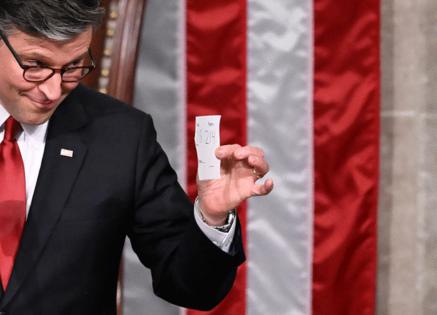
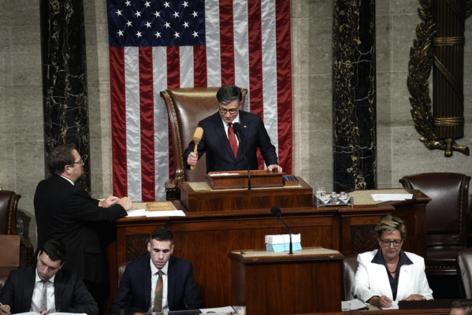
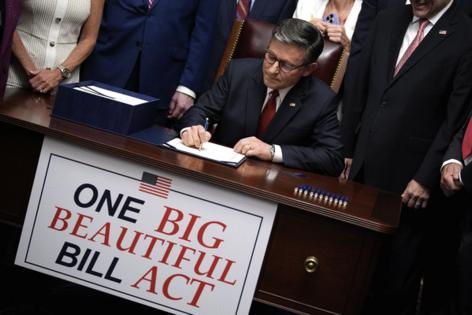
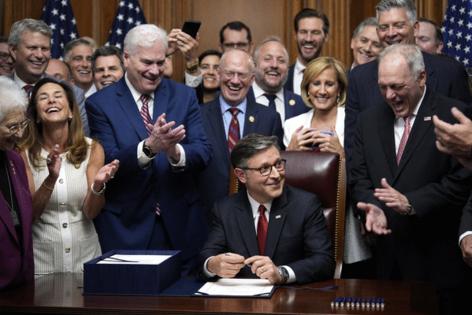
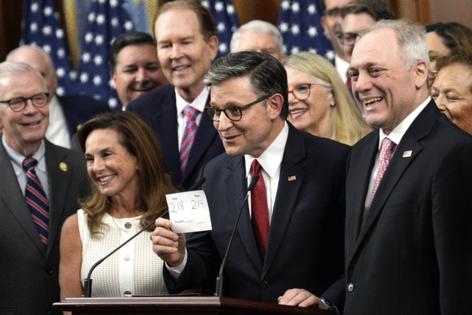





























































Comments